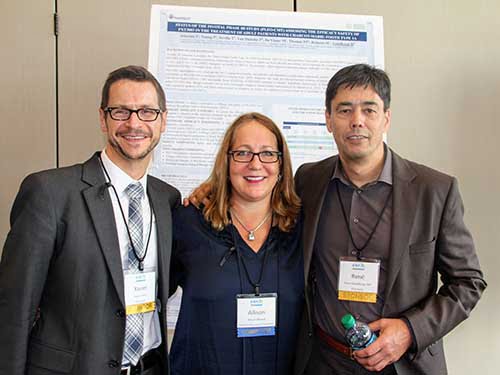
On November 3, 2017, nearly 100 participants gathered in Boston for HNF’s Patient-Centered CMT/HNPP Pain Summit. It was an incredible meeting of people with hereditary neuropathies and their family members, caregivers, clinicians, researchers, funding agencies, payors, leading pain experts and pharma industry coming together to get an understanding of chronic pain in the CMT/HNPP community, including its impact on quality of life.
The event began with a welcome from HNF Founder and CEO, Allison Moore, and a report from Robert Moore (Allison’s husband) on a voice survey about pain that was conducted by using TrueReply phone polling. Data regarding descriptions of pain symptoms (stabbing, shooting, aching, pressure), descriptions of how the pain impacts quality of life (“My pain keeps me from doing the things I love”), and currently used methods of pain management (fentanyl patch, gabapentin, marijuana, yoga, mindfulness) was recorded. The data collected in the phone survey will help inform academia, government, and industry in developing effective pain management programs and therapeutics specifically for the CMT/HNPP community’s needs.
Pamela Katz Ressler, RN, MS, HNB-BC and founder of Stress Resources in Concord, MA, then eloquently presented the Keynote Address, “Chronic Pain and the Importance of Social Networks.” She described how pain can cause isolation and loneliness, and that online communities (including HNF’s Inspire community with 4,900 members) help to facilitate gathering and sharing information, as well as provide the opportunity to mentor others, which reduces suffering and isolation.
John Novack, Director of Communications at Inspire, then conducted a live-time text poll with Summit participants to further explore chronic pain within the CMT/HNPP community. We learned:
- 64% of audience respondents stated they had chronic pain that was a combination of neuropathic, muscle and skeletal/ bone pain.
- 61% of respondents stated they had a combo of achy/sore, sharp/ stabbing, and tingling/electrical pain.
- The majority of respondents said their chronic pain rated 4-6 on a pain scale (with 10 being worst/completely debilitating pain).
- Most reported moderate to severe interference with their general activity, mood, and stress levels.
- Most reported moderate to severe impacts on sleep.
As a result, HNF now has some initial data to support further research and, hopefully, publication that documents the correlation between CMT/HNPP and pain!
We then heard from Clifford J. Woolf, MD, PhD, a leading, internationally-renown pain researcher as well as a professor at Harvard and researcher at Children’s Hospital Boston. Dr. Woolf gave us a preview on his new, potentially groundbreaking, research approach for studying painful chemotherapy-induced peripheral neuropathies and the implications his learnings might have for other types of painful neuropathies including CMT/HNPP.
The rest of the morning session was focused on methods to treat CMT/HNPP pain.
- Dr. Florian Thomas, director of HNF’s Center of Excellence at Hackensack University Medical Center, presented a much appreciated overview: “CMT/HNPP 101” including discussion in “simple” language of the anatomy of a nerve, demyelinating vs. axonal types of CMT, inheritance patterns, symptoms and their variability even within families, prevalence, and diagnostic methods.
- Dr. Jafar Kafaie, director of HNF’s Center of Excellence at St. Louis University, gave an overview of the types of chronic pain and the current standards of care for treating neuropathic/nerve and musculoskeletal pain.
- Dr. James Nussbaum, clinical and research director of ProHealth & Fitness PT OT, presented his case for the importance of physical and occupational therapy for CMT/ HNPP patients. He recommended his “Gravity Supported Program.” The program consists of three phases over twelve weeks, with a goal of increased repetitions of four core exercises. He also discussed the HNF-supported clinical trial of the AlterG anti-gravity treadmill.
- Mitch Warner, CPO, founder of Ortho Rehab Designs, presented his case for how ankle-foot-orthosis can treat pain by providing better alignment and a more natural gait. Warner created the Helios© brace, but his presentation shared an important list of corrections that patients should require of any/ all AFOs: balance restoration, triplanar correction, corrected alignment, prevention of further deformity, more functional gait, and energy return.
A panel including Bob Twillman, PhD (executive director of the Academy of Integrative Pain Management-AIPM), Pamela Katz Ressler (our keynote speaker) and Kristin Gelzinis (HNF patient advocate) discussed the current national focus on the “Opioid Crisis,” its effect on chronic pain patients, and the possible misunderstanding and misrepresentation of the cause of the “crisis.” While new prescribing guidelines have been issued, some physicians are opting out of prescribing pain medications and some insurers are limiting access to safer forms of opioids because they are more expensive. Meanwhile, there is little movement for insurers to cover non-pharmacological treatments for pain. This led to a conversation about the practice of Mindfulness-Based Stress Reduction and how powerful it has been in helping some CMT patients reduce the amount of pain medication they require.
During lunch, we heard from personal trainer and CMT-patient, Chris Dito. His inspiring story of getting himself out of a wheelchair and into the gym training others was powerful. Dito is the owner of Made for Motus and is a physical trainer specializing in human biomechanics with a focus is on posture and breathing.
The National Organization for Rare Disorders (NORD) representative, Allison Seebald, presented an overview of the robust natural history study to support the second most common inherited neuropathy, HNPP, as well as the rarer types for which there are major gaps of information. HNF is one of twenty rare disease communities chosen to develop this study with funding from NORD and the FDA.
Dr. Mamatha Pasnoor, from HNF’s Center of Excellence at the University of Kansas Medical Center, then presented her study of four common drugs used to treat pain in idiopathic neuropathy patients and how the study incorporated patient-reported outcome measures. Preliminary results show that there was no clear winner, but overall nortriptyline (75mg day) and duloxetine (60mg day) outperformed pregabalin (300mg day) and mexiletine (600mg day). This study is being funded by a grant from the Patient-Centered Research Outcomes Institute (PCORI), who also supported HNF’s 2016 and 2017 Summits as well.
After these presentations, the Summit participants then broke out into two groups to participate in one of two highly interactive workshops:
- “The CMT/HNPP Patient Experience Workshop,” where patients developed case studies to present to medical school students about CMT/HNPP with the help of facilitator Libby Bradshaw, DO, MS-academic director of the Pain Research Education and Policy Program at Tufts Medical School.
- “Communicating Your Pain Workshop,” where Gwenn Herman, LCSW-C, DCSW, clinical director and founder of Pain Connection (a U.S. Pain Foundation program), taught how to communicate with their healthcare providers by using a “Tree Plan” with seven branches (representing aspects of daily living): physical, cognitive/emotional, spiritual, social, career, leisure/hobbies and opportunities.
The Summit then wrapped up with several research updates. Allison Moore reported on current HNF initiatives, while Rene Goedkoop, MD (Pharnext), Kenneth Attie, MD (Acceleron Pharma), Thomas Wessel, MD, PhD (Flex Pharma), and Sean Ekins, MSc, PhD, DSc (Collaborations Pharma) presented their respective work on clinical trails for CMT and research for CMT/HNPP. A big thank you to all of the attendees, presenters, sponsors, and exhibitors who came together to make this year’s Summit another great success!



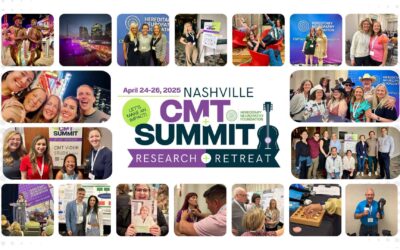
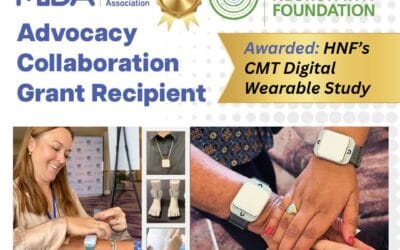
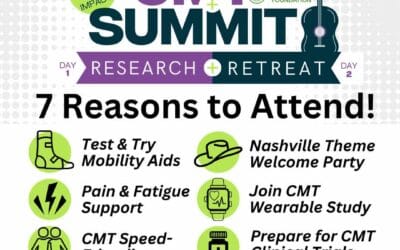
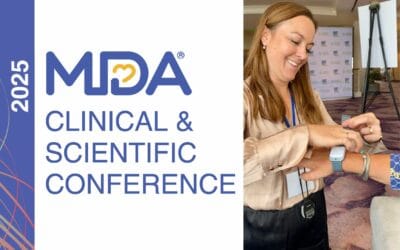

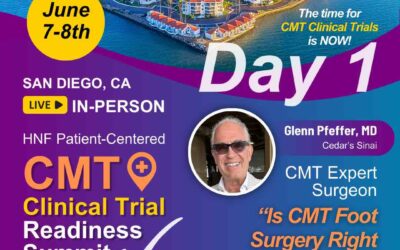
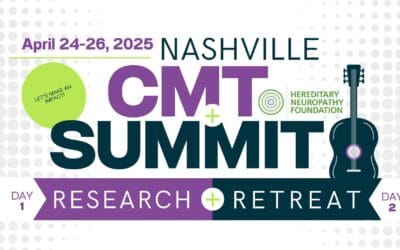
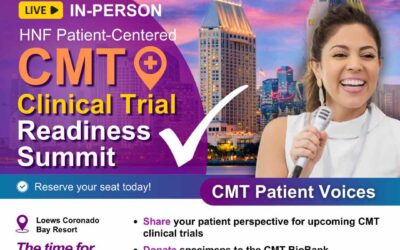
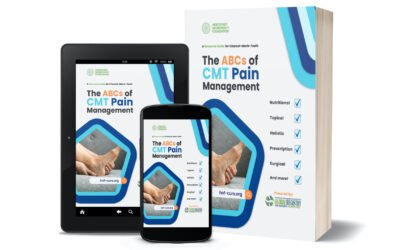
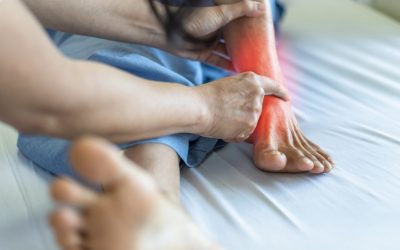
0 Comments